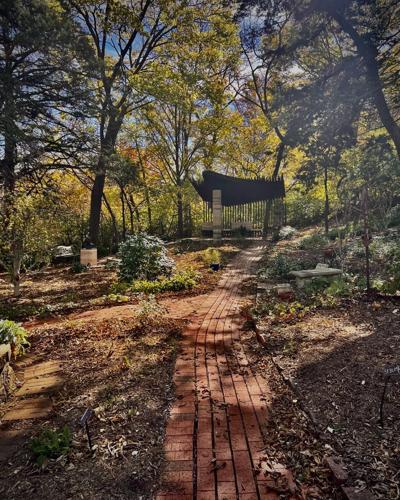Upon walking into the Audio-Reader Sensory Garden, people may hear the crunch of granite under their feet, wind chimes swinging, the smell of wood treated with an ancient Japanese charring method, aromatic plants and the tactile feel of greenery.
The oasis, tucked away in the northern corner of campus, is more than a relaxing destination. It is a sensory experience that draws students and community members alike.
The sensory garden is operated by the Audio-Reader Network, an organization on the University of Kansas’ campus that provides services for those who are blind, visually impaired, or print-disabled across Kansas and western Missouri. This includes audio versions of newspapers, magazines and books, and other free resources.
Audio-Reader’s sensory garden is designed to appeal to all the senses, so sight-impaired individuals can take in everything it has to offer, Assistant Development Director Meredith Johanning said. The garden’s pavilion was designed by a 2016 architecture design class and is next to the Audio-Reader center at 1120 W. 11th St., next to the old German library.
“I would say it's beneficial to students because when you come to it, it almost feels as if you're in another place,” Johanning said. “It's truly a sensorial experience as you walk through.”
KU no longer funds Audio-Reader
The garden started in the 1990s and has always been a privately funded operation.
The University used to supply direct funding to Audio-Reader, but it ended after June 2021. Johanning said it was a result of state funding cuts to the university.
Services like free reading for blind or visually impaired people and audio description all come from private funding. The University does provide the on-campus building that Audio-Reader is housed in, maintenance and HR services.
“That does help us in our mission of being able to do what we do, but as far as direct financial funding, we do not receive that anymore,” Johanning said.
The funding changes did not affect the sensory garden, but the Audio-Reader team has had to adjust other aspects of their service.
“[KU] gave us three years to prepare, which was quite helpful. We were able to ramp up our efforts, get the message out, and let people know what was going to happen. And we have been able to see great success with our supporters,” Johanning said.
When people see their donations making a difference, they may feel inclined to step up and help fill the gap themselves, Johanning said.
Garden volunteer seeks community help
The garden is supported by volunteers who come on a weekly basis to do maintenance and plant bulbs in the spring.
Head garden volunteer, Frank Male, has been involved for 13 years. At the age of 89, he says it has been hard to handle the day-to-day operations and is desperate for more volunteers.
Male helps organize volunteers, get materials, set up the garden and maintain it. He got involved after his son’s landscaping business was approached for help with the garden and appreciates that it gives him something to do.
Male said the garden could be promoted more and recognized how great it can be for everyone, especially those with sight impairments. After his neighbor lost her sight about a year ago, he took her to the garden to show her the benefits and beauty of it.
Male’s goal is to find someone to take his place as head volunteer because age has started to creep up on him, he says.
“I could spend six or eight hours a day about three or four years ago. I'm lucky if I could spend two hours right now, so the timing is limited,” Male said.
The garden currently has four regular volunteers but are always looking for more. It has been a challenge to get the word out about the garden, Johanning said. Potential volunteers can reach out to Beth McKenzie at 785-864-5336.
McKenzie, audio-reader development director, believes the garden is beneficial as it gives people an opportunity to learn how people who live differently can interact with nature, and offers students a chance to relax.
“I think it is one of the most underrecognized resources, or little gems and not just at KU, but in Lawrence,” McKenzie said. “I don't think very many students know about it,”
What else does Audio-Reader offer?
Although the University cut funding from Audio-Reader, its mission continues.
They also offer description services to those who are blind or visually impaired to describe live performances in real-time. Whether it is a musical, play, or other performance, trained volunteers narrate the non-speaking elements of the show to listeners.
This service allows listeners to follow along with the show with a headset that is checked out to them free of charge.
Audio-Reader’s goal is to allow people to enjoy an independent life, and part of that is being able to enjoy things that sighted people enjoy.
“Part of that is being able to enjoy entertainment and be able to take in things that sighted patrons are also able to take in,” Johanning said. “A big part of that is being able to go to a musical or a play or in this instance during the holidays.”




